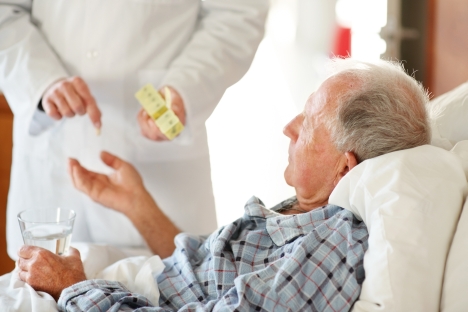Siberian scientists test anti-ageing pills on themselves

G5 might improve the quality of life, if not prolong it. Source: Lori / Legion Media
Siberian scientists have tested newly-developed drugs for the treatment of liver cirrhosis – more widely known as ‘anti-ageing pills’ – on themselves, without waiting for the results of clinical trials. The developers said they’d noticed very positive results that justify the time they’ve been working on the drugs, said Andrei Bekarev, the director of pharmaceuticals developer Scientific Future Management.
The new drug is the result of a joint project between experts from the Novosibirsk-based company and Pharmacology Scientific Research Institute of Tomsk. Bekarev said that official clinical trials of the new product will begin in November with volunteers, but it may be several years before it becomes available over the counter in pharmacies.
Bekarev prefers to call the G5 drug – which has been nicknamed ‘the anti-ageing pill’ by the mass media – a regenerative drug, since its principle function is to re-enable the body’s own regenerative functions. The drug that was discovered by the scientists almost by accident boosts the body’s production of stem cells, which enable the regeneration of the body’s organs and tissue. “We had a different end in mind when we began working on this product – it was intended for a complex approach to cytokines, which regulate the body’s immune reaction. The data, we had, indicated that it was possible to significantly decrease the dosage of these drugs during treatment. Once the action of the drug was documented, we started to realise that it might be capable of other applications too,” Bekarev said.
Related:
'Artificial Skin' pioneered by researchers in the Moscow region
Once the scientists knew the safety level of the drug, they began to test it on themselves.
“One of the institute staff members was suffering from a severe condition, which is traditionally considered to be incurable. But after some adhesive processes, he made a full recovery. Of course, one lone result isn’t enough to go on – there has to be a full sampling process,” the director of the pharmaceuticals development company said.
Tablets to cure cirrhosis
According to the developers, pre-clinical trials of the drug on animals have shown that G5 can cure frequently-encountered and intractable illnesses such as toxic liver cirrhosis. The livers of mice which were treated with the drug became entirely renewed.
“The drug has a wide range of applications – but to register it, we have to choose just one of them. If we chose ten medical applications, the clinical trials would go on for a hundred years,” Bekarev explained.
He went on to explain that the choice to register the drug for its use against liver cirrhosis arose from the potential it offered to get the drug released quickly onto the market. By November, the developers will conclude pre-clinical trials, after which the documentation of their results will be sent to the Health Ministry. Clinical trials can only begin once the ministry gives the go-ahead.
“It seems probable that the drug will come out in the form of capsules or tablets – the cost will depend on the scale of production. We are doing our most to make it affordably-priced,” the developers said.
Side Effects
During the preclinical trials of the drug, scientists noted a number of side effects which may become the topic of future research. “When we were testing for foetal toxicity, and how the drug may alter the course of pregnancy, we noted a very unusual result. Usually a drug is given in a high dosage and then tested on mice whose eggs are already fertilised – then we survey the number who survive this. Almost 100 percent of the mice which were tested survived, and gave birth to healthy mice” said a representative of the agency.
The scientists thought some error had crept into the result, so they repeated the test. The test results were confirmed, and in future there are plans to research G5’s potential for regenerating reproductive functions.
But the real sensation was another result of the Siberian team – a result which has resulted in the mass-media dubbing G5 “the anti-ageing pill.” As Bekarev explained, they divided 12-month-old rodent laboratory animals into two groups – an experimental group and a control group. The experimental group received the drug by mouth droplets.
“When they reached 18 months we saw a radical difference between the two groups. More than 30 percent of the control group had died of old age, and all the mice showed signs of ageing – arthritis in their feet, weight loss, changes in their blood chemistry. But the experimental group displayed body-mass two times higher than the control group, the rodents displayed no signs of ageing and their blood composition corresponded to that of healthy mice,” he said.
The experiment ran on until the experimental group of mice lived for more than 21 months. The scientists decided to run the experiment again, documenting it this time not as a laboratory experiment, but as a formal scientific study. Yet whatever the results may yield, Andrei Bekarev insists that he doesn’t intend to put out an ‘anti-ageing pill’ on the market, because the drug-testing for such use on humans could drag on for a hundred years.
On top of that, as the businessman stated, there are multiple theories about ageing. “It’s possible that G5 might improve the quality of life, if not prolong it. Stem cells are not the only thing behind ageing,” Bekarev said.
First published in RIA Novosti.
All rights reserved by Rossiyskaya Gazeta.
Subscribe
to our newsletter!
Get the week's best stories straight to your inbox